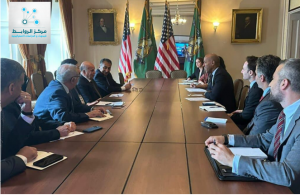By : Shatha Kalel *
In recent years, the Iraqi economy has faced significant disruptions, exacerbated by political instability, regional conflicts, and economic challenges. A critical aspect of these economic challenges is the volatility in the dollar exchange rate, driven by market demand and supply dynamics, particularly speculation. Economists have pointed out that the recent decline in the dollar exchange rate in Iraq is primarily due to reduced demand for cash dollars and pressures on the parallel market related to trade with Iran and Syria. However, this decline has not been directly attributed to the Central Bank’s actions but to speculations among traders following the central bank’s platform directives.
The Visit’s Objective
The Iraqi delegation’s visit to Washington aimed to create mechanisms for improving the state of Iraqi banks and the currency, and to resolve some of the sanctions imposed on certain banks. This visit reaffirmed Iraq’s commitment to the decisions of the US Treasury Department and its efforts to work transparently with foreign banks.
Importance of the Visit
In a pivotal move to address ongoing economic challenges, under the guidance of Prime Minister Muhammad Shia Al-Sudani, an Iraqi delegation comprising Foreign Minister Fuad Hussein, Central Bank Governor Ali Al-Alaq, and several specialists visited the United States. This visit represents a significant step towards improving the financial and banking situation in the country.
The delegation’s interactions with US officials were crucial for reaffirming Iraq’s commitment to banking reforms and transparency, aligning its financial institutions with international standards. Positive signs emerged from discussions with US Treasury officials, where Foreign Minister Fuad Hussein emphasized Iraq’s commitment to economic reforms, particularly in the banking and energy sectors. Among the notable initiatives discussed were gas investment projects aimed at achieving energy independence and improving the operational mechanisms of Iraqi banks to ensure transparency.
Anticipated Impacts
The visit and subsequent agreements are expected to have several significant impacts on the Iraqi economy:
Enhancing Financial Stability: By improving the operational efficiency of Iraqi banks and ensuring transparency, financial stability in Iraq is expected to strengthen. This will boost confidence in the banking sector and attract foreign investments, providing a much-needed stimulus to the economy.
Promoting Economic Growth: Improved bank operations and increased transparency will enable banks to offer better services to the Iraqi populace, fostering economic growth and development.
Improving the Energy Sector: By focusing on gas investment projects, Iraq aims to reduce its dependence on imported energy, bolstering its economic position and enhancing energy security.
Strengthening Iraq-US Relations: The visit and resulting agreements highlight the strengthening of ties between Iraq and the United States, a crucial factor for Iraq’s geopolitical and economic stability.
Conclusion
The visit by Foreign Minister Fuad Hussein, Governor Ali Al-Alaq, and their delegation to Washington represents a critical step towards stabilizing Iraq’s financial situation. By addressing the challenges facing the financial sector and adhering to economic reforms, Iraq is poised to enhance its financial stability and achieve sustainable economic growth. The positive reception from US officials and their readiness to support Iraqi reform initiatives signal a promising future for Iraq’s economy, contingent on continued government commitment to transparency and reform.
This visit not only reflects Iraq’s resolve to improve its economic standing but also underscores the importance of international cooperation in achieving economic stability and growth. The ongoing efforts to align with international banking standards and to pursue energy independence will be pivotal in shaping Iraq’s economic trajectory in the years to come.
Economic Unit / North America Office
Center for Strategic Studies and Research

